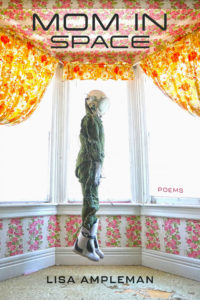
 Review by Laura Dennis
Review by Laura Dennis
The expression “mom in space,” might bring to mind a woman suffering from “mom brain,” COVID brain fog, or some combination thereof. The cover of Lisa Ampleman’s third full-length poetry collection, however, indicates we are talking about actual space, as in outer space, an impression confirmed by the opening epigraph from Diane Ackerman’s space-opera, The Planets.
That is not to say that other notions of space are absent from Mom in Space. Quite the contrary: it appears in myriad forms, as do varying takes on motherhood, rendering “mom in space” a highly polysemic expression, full of intricate layers. Not only do we have outer space, the space of the mind, and the confined space imposed by the pandemic lockdown, but also the space of the body, specifically the maternal body, a body that has experienced childbirth and faced both secondary infertility and an autoimmune disorder.
Throughout, the speaker explores gender roles both in outer space and on the ground, for example in the poem “Try Staying Home,” which depicts various female astronauts from the 1960s through today and includes the following 1984 exchange involving astronaut Anna Fisher:
“How does operating the arm make you
a better mother?” a reporter asked before the flight.
“Oh, I don’t think it did,” she replied.
One might hope this clever reply, coupled with a successful mission, would change hearts and minds. Alas, reactions to Karen Nyberg’s 2013 mission to the International Space Station suggest otherwise: “It has raised the question, among some, / of why a mother left a toddler at home / to follow a dream into space.”
Why indeed? To answer, the speaker wrestles with the false binary of career versus motherhood, not just for astronauts, but for herself, a writer and mother clad in a t-shirt that reads “‘I need space.’” Interestingly, for all the attention paid to female astronauts, the speaker seems to identify as or more strongly with Neil Armstrong, as seen in “Neil and Me and Work and the Body,” the lyric essay that forms the second part of the collection. And yet, despite an assertion, quoted in “Supermommy,” that thanks to the Space Shuttle, “‘even poets’ could go into space,’” the speaker admits that for her, superherodom means remaining earthbound.
Besides, even space flight does not always provide the protection typically afforded heroines, especially if the heroine in question is Black, as we learn in “Mae & Nichelle, in Space & On Earth,” in which the first Black woman in space, Dr. Mae Jemison, appears alongside Black actress Nichelle Nichols in Star Trek.
Mae has
morphed: from audience, to astronaut, to actress:
—to arrested.
The alliteration, along with the use of punctuation and white space, serve as a powerful segue into recounting Dr. Jemison’s brutal arrest during a traffic stop. The section concludes:
It’s like the plot of a
one-hour sci-fi show, if the police were aliens on an off-kilter planet—except that
an investigation will clear the officer, and the plot seems almost like a cliché,
repeated ad infinitum. If she were back on the show, they’d fire the interstellar
engines, steer the ship far away, toward some more welcoming galaxy.
As this example shows, the poems about space are never only about space, but rather branch out into other themes. Likewise, many of the poems about motherhood follow this tendency, although some remain focused on a single image or experience. Throughout, readers encounter incredible inventiveness when it comes to both organization and form.
Mom in Space is divided into three sections, each prefaced by a black page featuring a moon phase. We often talk about white space, but how often do we see its opposite? Similarly, how many essays feature section breaks that suggest the light and dark sides of the moon? The most striking feature of the collection, however, is the shape of individual poems on the page, whether it be “Point of Departure,” which tells side-by-side stories of a freeway accident and pregnancy loss, or “Omega,” in which the shape of the indents echoes the poem’s subject, earthrise.
The author’s knowledge of all things space-related is vast, and this reviewer often found herself grateful for the four pages of explanatory notes. Even if, like the speaker, we are unlikely ever to find ourselves in a rocket waiting to launch, Mom in Space shows us the many reasons that it matters, both for its own sake and for what it can tell us about ourselves.
Mom in Space by Lisa Ampleman
LSU Press 2024 $20.95 / $9.95 [paper / e-book]
ISBN: 9780807181256 / e-ISBN: 9780807181591
Laura Dennis teaches world languages in Appalachia and co-edits book reviews for MER. She has published book reviews and her own creative work in a variety of outlets, including MER Vox Quarterly, Still: The Journal, Change Seven, McNeese Review, Red Branch Review, Bluff & Vine, and Northern Appalachia Review.
